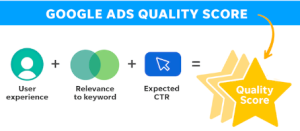Quality Score
Definition
Quality Score is a metric used in digital advertising, particularly in Google Ads, that measures the quality and relevance of an advertiser’s keywords, ads, and landing pages.
Description
A score between 1 and 10 helps determine the ad’s position in search results and the cost per click (CPC) the advertiser pays. A higher score can lead to a better ad position and lower CPC, while a lower score can result in a lower ad position and higher CPC. The Quality Score is determined by factors such as the ad’s click-through rate (CTR), the ad’s relevance to the keyword, and the landing page quality.

Source: www.google.com
It is based on several factors, including the ad’s click-through rate (CTR), the ad’s relevance to the keyword, and the quality of the landing page. A high-Quality Score indicates that the ad is relevant and valuable to the user. Thus, the search engine rewards the advertiser with a higher ad position and lower CPC. Conversely, a low-Quality Score indicates that the ad is not as relevant to the user’s search, and thus, the advertiser is penalised with a lower ad position and higher CPC.
Improving the score requires optimising the ad, keyword, and landing page for relevance and user experience. This includes writing compelling ad copy, targeting relevant keywords, and ensuring the landing page provides a positive user experience. By improving the score, advertisers can increase the effectiveness of their paid search campaigns and maximise their return on investment.
Importance of Knowing Quality Score in Digital Marketing
Knowing the Quality Score in digital marketing is important for several reasons:
- Ad position and CPC: It affects the ad’s position in search results and the cost per click (CPC) that the advertiser pays. A higher Quality Score leads to a better ad position and lower CPC, while a lower Quality Score can result in a lower ad position and higher CPC.
- Optimization: It provides insights into how well the ad, keyword, and landing page perform. By knowing the score, advertisers can identify areas for improvement and optimise their campaigns for better performance.
- Relevance: It measures the significance of the ad to the user’s search query, ensuring that users are presented with advertisements that are most relevant to their needs. This helps to improve user experience and increase the likelihood of clicks and conversions.
- Competition: It determines ad rank, which affects the competition for ad placement. Advertisers with a higher Quality Score can outrank competitors with a lower Quality Score, leading to better visibility and higher click-through rates.
- Cost-effectiveness: By improving the score, advertisers can increase the effectiveness of their campaigns and maximise their return on investment. This can lead to cost savings and better campaign performance over time.
Strategy to improve quality score in digital marketing?
Improving the Quality Score requires a multi-faceted approach that involves optimising the ad, keyword and landing page for relevance and user experience. Here are some strategies to improve Quality Score:
- Relevant keywords: Use relevant keywords closely related to the ad and the landing page. Make sure to group similar keywords into ad groups and create specific ads for each group.
- Compelling ad copy: Write persuasive ad copy that matches the user’s search query and highlights the unique value proposition of the product or service. Use ad extensions to provide additional information and improve visibility.
- Landing page experience: Ensure that the landing page is relevant to the ad and provides a positive user experience. Optimise the page for speed, clarity, and ease of use, and ensure it provides the information the user is looking for.
- Mobile optimization: With more and more users accessing the web through mobile devices, optimising the landing page for mobile devices is essential. Ensure that the page is mobile-friendly and loads quickly on mobile devices.
- Quality content: Provide high-quality content on the landing page that matches the user’s search query and provides relevant information. Use multimedia such as images and videos to enhance the user experience.
- Improve click-through rate (CTR): A higher CTR indicates that the ad is relevant to the user’s search query. Use compelling ad copy, relevant keywords, and extensions to improve CTR.
- Use negative keywords: Use negative keywords to exclude irrelevant searches and improve ad relevance. Negative keywords ensure the ad is not shown to unlikely convert users.
How will Quality Score impact digital marketing?
In the future, dealing with Quality Score may vary as search engines and digital platforms continue to evolve and incorporate new ranking factors and algorithms. Here are some potential changes that could impact how marketers deal with it:
- AI and machine learning: As artificial intelligence (AI) and machine learning algorithms become more sophisticated, search engines may be able to analyse user behaviour and ad performance more accurately. This could result in a greater emphasis on user engagement metrics and personalised ad targeting. Hence, the quality score will depend on how satisfied users are.
- Voice search: With the rise of voice assistants like Siri and Alexa, search queries are becoming more conversational and natural. This could lead to a greater emphasis on long-tail keywords and natural language processing in ad targeting.
- Privacy and data protection: With growing concerns over privacy and data protection, search engines may place greater importance on user consent and transparency in data collection and ad targeting.
- Integration with other channels: As digital marketing channels become more integrated, Quality Score may be used to rank ads across multiple platforms and channels. This could lead to greater consistency in ad performance and more efficient targeting across channels.
Example
Though it is difficult to know the quality score of an advertiser but one brand that has shown effective marketing include Flipkart.

Source: www.google.com
Flipkart, an Indian e-commerce company, has consistently been ranked among the top digital advertisers in India. The company has implemented a range of optimization strategies to improve the relevance and performance of its ads, including:
- Relevant keywords: Flipkart uses highly relevant keywords that match the user’s search intent and have high commercial intent. The company profoundly understands its target audience and uses this knowledge to create targeted ad campaigns.
- Compelling ad copy: Flipkart’s ad copy is clear and emphasises the unique value proposition of its products. The company uses ad extensions and site links to provide additional information and improve ad performance.
- Landing page experience: Flipkart’s landing pages are optimised for relevance and user experience. The company uses clear, concise messaging, high-quality images, and a simple user interface to improve conversion rates.
FAQ
What is a Quality Score?
It is a metric used by search engines to measure the relevance and Quality of an ad, keyword, or landing page. It affects the ad rank and cost-per-click (CPC) in paid search advertising.
How is the Quality Score calculated?
It is calculated based on several factors, including the relevance of the ad to the search query, the expected click-through rate (CTR) of the ad, the landing page experience, and the ad’s historical performance.
Why is Quality Score important?
It plays a crucial role in determining the ad rank and CPC of an ad. Ads with higher Quality Scores generally receive better ad positions and lower CPCs than ads with lower Quality Scores. This makes it a crucial factor in optimising the cost and effectiveness of paid search campaigns.
How can I improve my Quality Score?
You can improve your score by focusing on the relevance of your ad to the search query, improving the expected CTR of your ad, optimising the landing page experience, and ensuring that your ads have a strong historical performance.
Can Quality Score affect organic search results?
No, it only affects paid search advertising. Therefore, it does not directly impact organic search results.
What are some tools or resources available to help improve the Quality Score?
Google Ads provides a Quality Score reporting tool that shows the score of your keywords, ads, and landing pages. Additionally, several online resources, such as blogs and forums, offer tips and best practices for improving Quality Scores.





We would love to have your opinion.